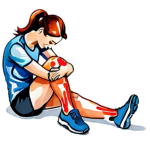Getting your muscles back in shape after a workout is a big deal if you want to keep performing your best. It's not just about feeling good; it's about making sure your body is ready for whatever you throw at it next. Think of it like tuning up a car – you wouldn't expect it to run perfectly if you never gave it some care. This article will go over some simple, but super effective, muscle recovery methods that can really help you stay at the top of your game.
Key Takeaways
- Good sleep helps your body fix itself and get ready for the next day.
- Eating right gives your muscles the fuel and building blocks they need to recover.
- Staying active, even with light movement, can help with blood flow and recovery.
- Learning to handle aches and pains means you can keep moving without bigger problems.
- Keeping a healthy weight takes stress off your body, which helps your muscles feel better.
1. Sleep
Okay, let's talk about sleep. It's not just about feeling less grumpy in the morning; it's a major player in muscle recovery. Think of it as your body's personal repair shop, working overtime while you're catching those Z's. Seriously, skimping on sleep is like trying to build a house with missing bricks – it just won't hold up.
Getting enough sleep is non-negotiable if you're serious about peak performance.
When you sleep, your body releases hormones that help repair muscle tissue. It also increases blood flow to your muscles, bringing in nutrients and removing waste products. Basically, sleep is when all the magic happens.
So, how do you make sure you're getting enough quality sleep? Here are a few things that have helped me:
- Stick to a schedule: Try to go to bed and wake up around the same time every day, even on weekends. This helps regulate your body's natural sleep-wake cycle.
- Create a relaxing bedtime routine: Wind down with a warm bath, read a book, or listen to some chill music. Avoid screens for at least an hour before bed.
- Optimize your sleep environment: Make sure your bedroom is dark, quiet, and cool. A comfortable mattress and pillows can also make a huge difference. Adults typically need 7-9 hours of sleep nightly, with athletes or those training intensely potentially requiring more for optimal muscle recovery.
2. Diet
Okay, so you're crushing it in the gym, but what about your fuel? Diet is super important for muscle recovery. It's not just about protein shakes (though those help!). It's about giving your body the right building blocks to repair and rebuild after those intense workouts. Think of it like this: you wouldn't build a house with flimsy materials, right? Same goes for your muscles!
A balanced diet is key.
Here's the lowdown:
- Protein: Gotta have it! Aim for lean sources like chicken, fish, beans, or tofu. They're the main building blocks for muscle repair.
- Carbs: Don't be scared of carbs! They replenish your glycogen stores, which are like your muscles' energy reserves. Think sweet potatoes, brown rice, or quinoa.
- Healthy Fats: These help with hormone production and reduce inflammation. Avocado, nuts, and olive oil are your friends.
Don't forget about hydration! Water is essential for, well, everything. It helps transport nutrients, flush out waste products, and keeps your muscles functioning properly. Aim for plenty of water throughout the day, especially before, during, and after workouts.
And hey, maybe consider adding some anti-inflammatory foods to your plate. Things like berries, leafy greens, and fatty fish can help reduce muscle soreness and speed up recovery. It's all about giving your body the love it deserves! Make sure you consume a balanced diet to aid muscle recovery.
3. Physical Activity
Okay, so you've been hitting the weights hard, or maybe you just finished an intense cardio session. Now what? Time to collapse on the couch? Nope! Believe it or not, physical activity can actually help you recover faster. I know, it sounds counterintuitive, but hear me out.
Active recovery is the name of the game. It's all about getting your blood flowing to those tired muscles, which helps clear out waste products and deliver nutrients. Think of it as giving your muscles a gentle massage from the inside out. It doesn't have to be anything crazy, just something to keep you moving.
Think of your muscles like a sponge. When they're all squeezed out after a workout, they need to be rehydrated and replenished. Light physical activity helps to do just that, bringing in fresh blood and nutrients to help them recover.
Here are a few ideas to get you started:
- Light Cardio: A brisk walk, a leisurely bike ride, or even some time on the elliptical at a low intensity can do wonders. The goal is to boost blood flow without putting too much stress on your body.
- Yoga or Stretching: Gentle stretching can help improve flexibility and reduce muscle tension. Plus, it's a great way to relax and unwind after a tough workout.
- Swimming: The buoyancy of water takes the pressure off your joints, making swimming a fantastic option for active recovery. It's also a great full-body workout that's easy on the body.
4. Pain Management
Okay, let's talk about pain. It's a bummer, but it's also something we can often manage effectively. Ignoring pain can lead to bigger problems down the road, so let's look at some ways to keep it in check and keep you performing at your best.
Finding the right pain management strategy can make a huge difference in your recovery and overall well-being.
- Over-the-counter meds: Things like ibuprofen or acetaminophen can be super helpful for mild to moderate pain. Just be sure to follow the directions and not overdo it.
- Topical treatments: Creams and gels with ingredients like menthol or capsaicin can provide localized relief. I've used them before, and they can be pretty effective for sore muscles.
- Alternative therapies: Don't knock it 'til you try it! Acupuncture, massage, and even meditation can help manage pain. I know a few people who swear by these methods.
It's important to listen to your body. If the pain is severe or doesn't improve with these methods, definitely see a doctor or physical therapist. They can help you figure out what's going on and create a plan to get you back on track. Sometimes, professional guidance is what you need to relieve sore muscles and get back to your peak performance.
5. Weight Management
Okay, so weight management. It's not just about looking good, it's about feeling good, especially when you're trying to recover from tough workouts. Think of it this way: every extra pound is extra stress on your muscles and joints. Shedding some of that weight can seriously improve your recovery time and overall performance. It's all connected, you know?
Maintaining a healthy weight isn't just about aesthetics; it's a cornerstone of effective muscle recovery. By reducing the strain on your body, you're setting the stage for faster healing and improved athletic performance. It's a win-win!
Here's a few things to keep in mind:
- Focus on a balanced diet. It's not about starving yourself, it's about fueling your body with the right stuff. Think lean proteins, complex carbs, and healthy fats.
- Incorporate regular cardio. Even light activities like walking or cycling can help you burn calories and manage weight without overdoing it.
- Don't forget strength training. Building muscle helps you burn more calories at rest, which is always a good thing. Plus, stronger muscles support your joints better.
Wrapping It Up: Your Recovery Journey Starts Now!
So, there you have it! We've gone over some really good ways to help your muscles bounce back. Remember, getting your muscles to recover well isn't just about feeling better after a tough workout. It's about making sure you can keep going, keep pushing, and keep getting stronger. Think of these tips as your personal toolkit. Try them out, see what works best for you, and don't be afraid to mix things up. Your body will thank you, and you'll be ready to tackle whatever comes next, feeling great and ready to go!
Frequently Asked Questions
Why is sleep so important for muscle recovery?
Getting enough good sleep is super important because it's when your body does most of its repair work. Think of it like charging your phone overnight; your muscles and tissues need that downtime to fix themselves up after a workout. If you don't sleep enough, your body can't recover well, which means you might feel tired, sore, and not perform your best.
How does my diet affect how quickly my muscles recover?
Eating the right foods gives your body the building blocks it needs to repair and grow muscles. Protein helps rebuild muscle fibers, while carbs give you energy. Fruits and veggies have vitamins and minerals that help reduce swelling and keep your body working smoothly. A good diet helps your muscles bounce back faster and stronger.
Can exercise help my muscles recover, or should I just rest?
It might seem strange, but gentle movement can actually help sore muscles. Light activities like walking or stretching increase blood flow to your muscles, which helps carry away waste products and bring in fresh nutrients. This can make you feel less stiff and speed up recovery. Just don't overdo it!
What's the role of pain management in getting my muscles back to normal?
Pain is your body's way of telling you something is wrong. Managing pain means finding ways to lessen that discomfort so you can move more easily and continue your recovery. This could involve things like ice, heat, gentle stretches, or even talking to a doctor about what's causing the pain. Less pain means you can recover better and get back to your activities.
How does my weight impact muscle recovery?
When you carry extra weight, it puts more stress on your joints and muscles, especially during exercise. This extra stress can make recovery harder and slower, and even lead to injuries. Keeping a healthy weight helps reduce this stress, making it easier for your muscles to recover and perform well.
Which recovery method is the most important?
It's best to use a mix of methods! Sleep is the foundation, and a good diet fuels everything. Gentle physical activity can help, and managing any pain lets you keep moving. Keeping a healthy weight reduces overall strain. All these things work together to help your muscles recover faster and get you ready for your next challenge.



